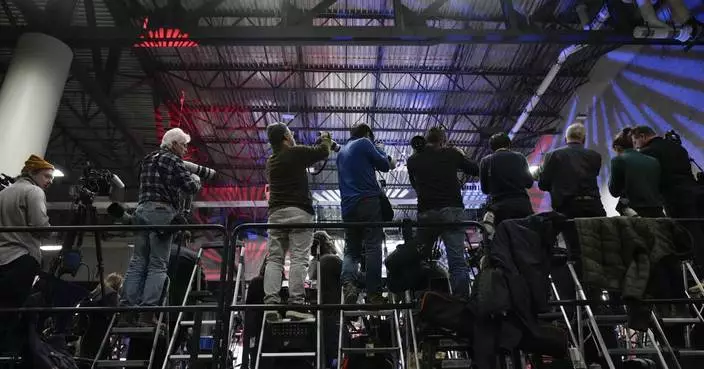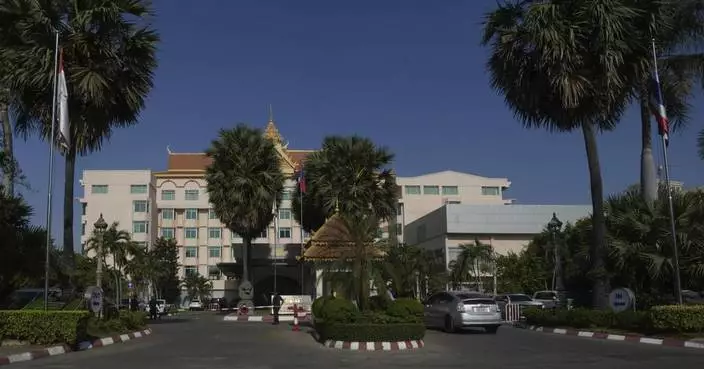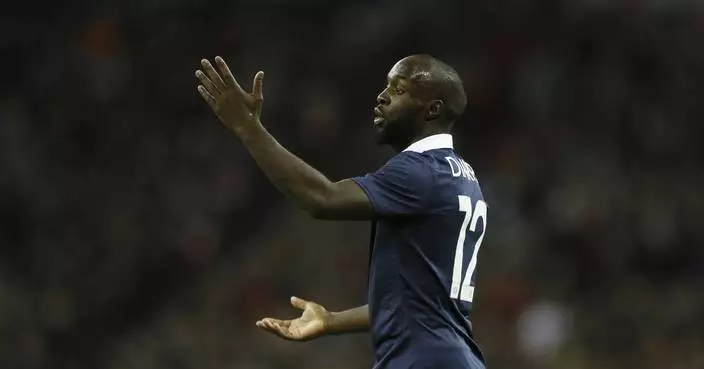Turkish President Recep Tayyip Erdogan on Tuesday issued a veiled threat suggesting Turkey could release the Islamic State group prisoners it holds and send them to Europe, angered at a EU decision to impose sanctions on his country over its drilling for gas in Mediterranean waters off Cyprus.
Speaking to reporters before a visit to the United States, Erdogan also said Turkey would continue repatriating foreign Islamic State militants to their home countries, even if those countries decline to take them back.
Click to Gallery
Turkish President Recep Tayyip Erdogan on Tuesday issued a veiled threat suggesting Turkey could release the Islamic State group prisoners it holds and send them to Europe, angered at a EU decision to impose sanctions on his country over its drilling for gas in Mediterranean waters off Cyprus.
He added: "These gates will open and these IS members who have started to be sent to you will continue to be sent. Then you can take care of your own problem."
Turkey said last week that about 1,200 IS militants were in Turkish prisons and 287 IS members, including women and children, were captured during Turkey's offensive in Syria, launched last month.
While Turkey has quietly deported IS sympathizers for years, it raised the issue more forcefully after Western nations refused to back its offensive against Syrian Kurdish fighters whom Ankara considers to be terrorists linked to Kurdish militants fighting inside Turkey. Many countries have voiced concerns that the Turkish incursion would lead to a resurgence of IS.
Turkish President Recep Tayyip Erdogan shows a document as he speaks to reporters before a visit to the United States, in Ankara, Turkey, Tuesday, Nov. 12, 2019. Erdogan warned European nations Tuesday that his country could release all the Islamic State group prisoners it holds and send them to Europe, in response to EU sanctions over Cyprus.(Presidential Press Service via AP, Pool)
"You should revise your stance toward Turkey, which at the moment holds so many IS members in prison and at the same time controls those in Syria," Erdogan warned European nations, a day after the EU unveiled a system to sanction Turkey.
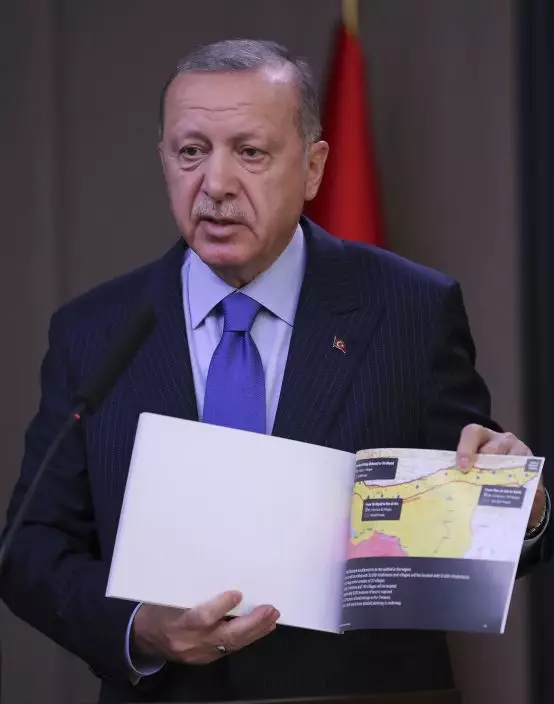
Turkish President Recep Tayyip Erdogan shows a document with a map of Turkey-Syria border as he speaks to reporters before a visit to the United States, in Ankara, Turkey, Tuesday, Nov. 12, 2019. Erdogan warned European nations Tuesday that his country could release all the Islamic State group prisoners it holds and send them to Europe, in response to EU sanctions over Cyprus.(Presidential Press Service via AP, Pool)
He added: "These gates will open and these IS members who have started to be sent to you will continue to be sent. Then you can take care of your own problem."
Erdogan's comments came as Turkey launched a new push to send back captured foreign fighters to their home countries, telling Western nations that Turkey was not a "hotel" for IS fighters and criticizing them for their reluctance to take back citizens who had joined the ranks of the extremist group as it sought to establish a "caliphate" in Iraq and Syria.
Turkey deported citizens of the United States, Denmark and Germany on Monday and announced plans to soon expel seven other German nationals, two Irish nationals and 11 French nationals.
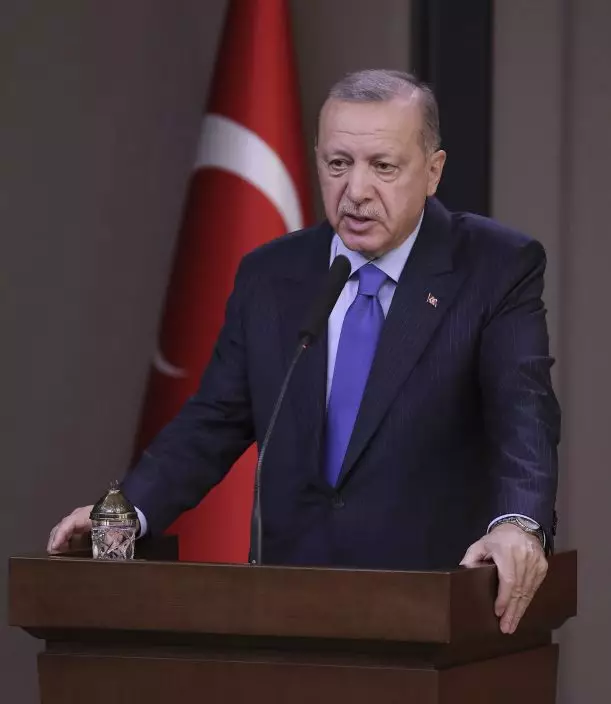
Turkish President Recep Tayyip Erdogan speaks to reporters before a visit to the United States, in Ankara, Turkey, Tuesday, Nov. 12, 2019. Erdogan warned European nations Tuesday that his country could release all the Islamic State group prisoners it holds and send them to Europe, in response to EU sanctions over Cyprus.(Presidential Press Service via AP, Pool)
Turkey said last week that about 1,200 IS militants were in Turkish prisons and 287 IS members, including women and children, were captured during Turkey's offensive in Syria, launched last month.
The latest spat with the EU is over exploration for gas around EU member Cyprus. Turkish drillships, escorted by warships, began exploratory drilling this summer in waters where Cyprus says it has exclusive economic rights. Turkey says it is protecting its rights and those of Turkish Cypriots on the divided island.
EU foreign ministers adopted a mechanism making it possible "to sanction individuals or entities responsible for, or involved in, unauthorized drilling activities of hydrocarbons." EU member countries can now come forward with names of those they think should be listed.
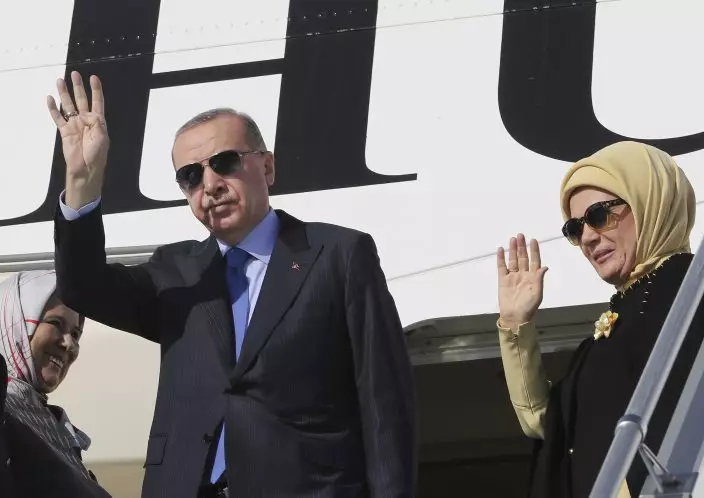
Turkish President Recep Tayyip Erdogan and his wife Emine Erdogan wave as they board a plane before a visit to the United States, in Ankara, Turkey, Tuesday, Nov. 12, 2019. Erdogan warned European nations Tuesday that his country could release all the Islamic State group prisoners it holds and send them to Europe, in response to EU sanctions over Cyprus.(Presidential Press Service via AP, Pool)
While Turkey has quietly deported IS sympathizers for years, it raised the issue more forcefully after Western nations refused to back its offensive against Syrian Kurdish fighters whom Ankara considers to be terrorists linked to Kurdish militants fighting inside Turkey. Many countries have voiced concerns that the Turkish incursion would lead to a resurgence of IS.
Turkish news reports said Monday that a U.S. citizen who had been deported by Turkey was stuck in a heavily militarized no man's land between Greece and Turkey, after Greece refused to take him in.
Asked to comment on the reports, Erdogan said: "Whether they are stuck there at the border it doesn't concern us. We will continue to send them. Whether they take them or not, it is not our concern."
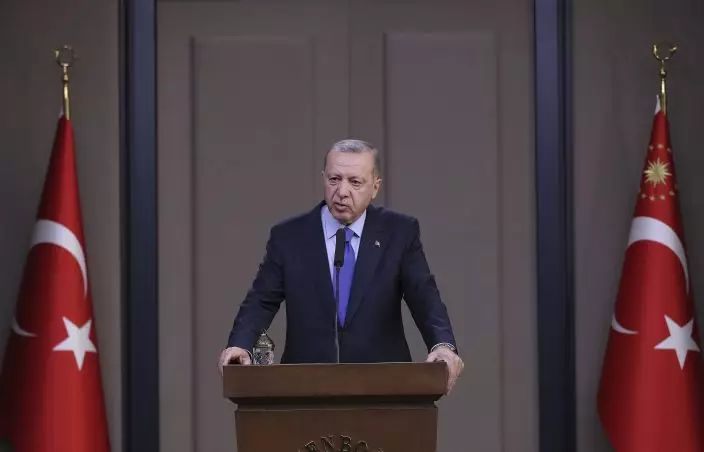
Turkish President Recep Tayyip Erdogan speaks to reporters before a visit to the United States, in Ankara, Turkey, Tuesday, Nov. 12, 2019. Erdogan warned European nations Tuesday that his country could release all the Islamic State group prisoners it holds and send them to Europe, in response to EU sanctions over Cyprus.(Presidential Press Service via AP, Pool)
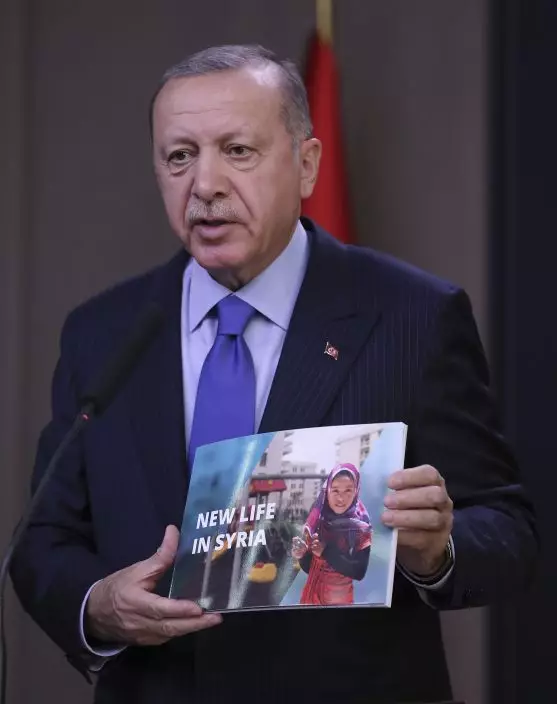
Turkish President Recep Tayyip Erdogan shows a document as he speaks to reporters before a visit to the United States, in Ankara, Turkey, Tuesday, Nov. 12, 2019. Erdogan warned European nations Tuesday that his country could release all the Islamic State group prisoners it holds and send them to Europe, in response to EU sanctions over Cyprus.(Presidential Press Service via AP, Pool)
BEIRUT (AP) — The European Union announced Thursday an aid package for Lebanon of 1 billion euros — about $1.06 billion — much of which will go to boost border control to halt the flow of asylum seekers and migrants from the small, crisis-wracked country across the Mediterranean Sea to Cyprus and Italy.
The deal follows other EU aid packages for countries such as Egypt, Tunisia and Mauritania to fortify their borders. It comes against a backdrop of increasing hostility toward Syrian refugees in Lebanon and a major surge in irregular migration of Syrian refugees from Lebanon to Cyprus.
European Union Commission President Ursula von der Leyen said during a Beirut visit with Cypriot President Nikos Christodoulides that the aid distribution will start this year and last till 2027.
The bulk of the aid — 736 million euros — would go to support Syrian refugees “and other vulnerable groups” in Lebanon, while 200 million euros are meant to bolster Lebanese security services in enforcing border and migration control, according to figures provided by the Cypriot government.
An unspecified amount would go to Lebanese fishermen, to discourage them from selling their boats to smugglers.
Von der Leyen said the EU will also work on a “more structured approach to voluntary return" of Syrian refugees "in close cooperation with” the U.N. refugee agency. The bloc will continue to maintain “legal pathways” for resettlement of refugees in Europe, she said.
Lebanon's caretaker Prime Minister Najib Mikati praised the package, saying that “Lebanon’s security is security for European countries and vice versa,” and that an escalation of the crisis ”will not be limited to Lebanon but will extend to Europe."
Lebanon, which has been in the throes of a severe financial crisis since 2019, hosts nearly 780,000 registered Syrian refugees and hundreds of thousands more who are unregistered, the world's highest refugee population per capita.
Lebanese political officials have for years urged the international community to resettle the refugees in other countries or assist their return to Syria — voluntarily or not. Lebanese security forces have stepped up deportations of Syrians over the past year.
Tensions further flared after an official with the Christian nationalist Lebanese Forces party, Pascal Suleiman, was killed last month in what military officials said was a botched carjacking by a Syrian gang. The incident prompted outbreaks of anti-Syrian violence by vigilante groups.
Meanwhile, Cypriot authorities complain the island nation has been overwhelmed by irregular migration of Syrian asylum seekers, many of them coming on boats from Lebanon.
The UNHCR in Lebanon said it had verified 59 “actual or attempted” departures by boats carrying a total of 3,191 passengers from Lebanon between January and mid-April, compared to three documented boat movements carrying 54 passengers in the same period last year. Usually, few boats attempt the much more dangerous crossing in the winter. In all of 2023, UNHCR recorded 65 boat departures carrying 3,927 passengers.
Cyprus has taken a new approach to halting the flow of migrants. Last month, it suspended processing of Syrian asylum applications, and human rights groups accused the Cypriot coast guard of forcibly turning back five boats carrying about 500 asylum seekers coming from Lebanon. Cypriot officials have denied this.
Bassel al-Shayoukh, a Syrian refugee from Idlib living in Lebanon since 2014, said his brother and several cousins and nephews were on one of the boats turned back. Now he wants to make the journey himself.
“In the beginning I thought that in a year or two the war would be over in Syria,” he said, but it dragged on, while in Lebanon “every year ... the situation began to get worse.”
Shayoukh said he fears being beaten by vigilantes or deported to Syria after Lebanese authorities declined to renew his residency permit.
His 17-year-old nephew, who declined to give his name fearing for his safety, said the Cypriot coast guard started making waves to push the boat he was on away. “I was terrified... I don’t know how to swim,” he said. “I thought we were going to die.”
The people on the boats “stayed three days without food or water” before turning back to Lebanon, the teen added.
Back in Lebanon, they were detained by the army; those registered with UNHCR were released and the others deported.
Mohammed Sablouh, a Lebanese human rights lawyer who works on refugee and migrant cases, says Lebanese authorities are deliberately “turning a blind eye" to the surge in migration to "pressure the international community.”
The Lebanese army did not respond to a request for comment on their measures to combat smuggling.
Thursday's aid announcement comes ahead of the annual fundraising conference for the Syrian crisis in Brussels later this month. After 13 years of civil war, donor fatigue has set in while the world’s attention is occupied by the humanitarian fallout of more recent conflicts in Ukraine and Gaza.
The Cypriot president said Thursday was a “historic day” and called for European officials to go farther and declare some areas of Syria safe for return.
“The current situation is not sustainable for Lebanon. It is not sustainable for Cyprus, it is not sustainable for the European Union,” Christodoulides said.
But not all Lebanese officials are convinced the European aid would solve the problem.
Lebanese Forces party head Samir Geagea told The Associated Press earlier this week that European authorities are mainly concerned “that the refugees don’t go to Europe."
"For us the problem is that we cannot have our country drowning in illegal Syrian refugees,” Geagea said, urging for Syrians to be sent back to either government or opposition-held areas of the neighboring country.
But Shayoukh says he has nowhere to go.
The Damascus government wants him for opposing Syrian President Bashar Assad, he said, while the Islamist group that now controls his hometown behaves "the same way as the regime’s intelligence services” in crushing dissidents.
Associated Press writer Menelaos Hadjicostis in Nicosia, Cyprus, contributed to this report.
Follow AP’s global migration coverage at: https://apnews.com/hub/migration

Lebanese caretaker Prime Minister Najib Mikati, center, speaks during his meeting with Cyprus' President Nikos Christodoulides, left, and President of the European Commission Ursula von der Leyen at the government palace in Beirut, Lebanon, Thursday, May 2, 2024. (AP Photo/Hassan Ammar)
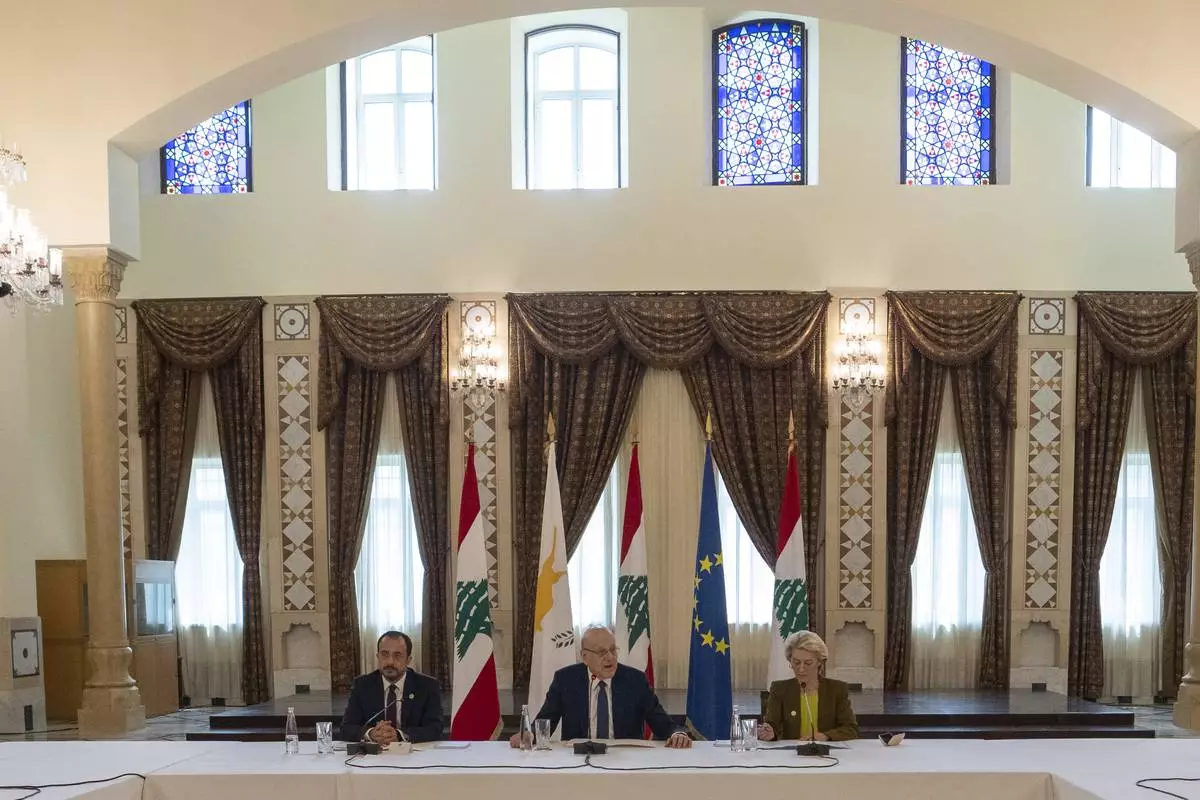
Lebanese caretaker Prime Minister Najib Mikati, center, speaks during his meeting with Cyprus' President Nikos Christodoulides, left, and President of the European Commission Ursula von der Leyen at the government palace in Beirut, Lebanon, Thursday, May 2, 2024. (AP Photo/Hassan Ammar)
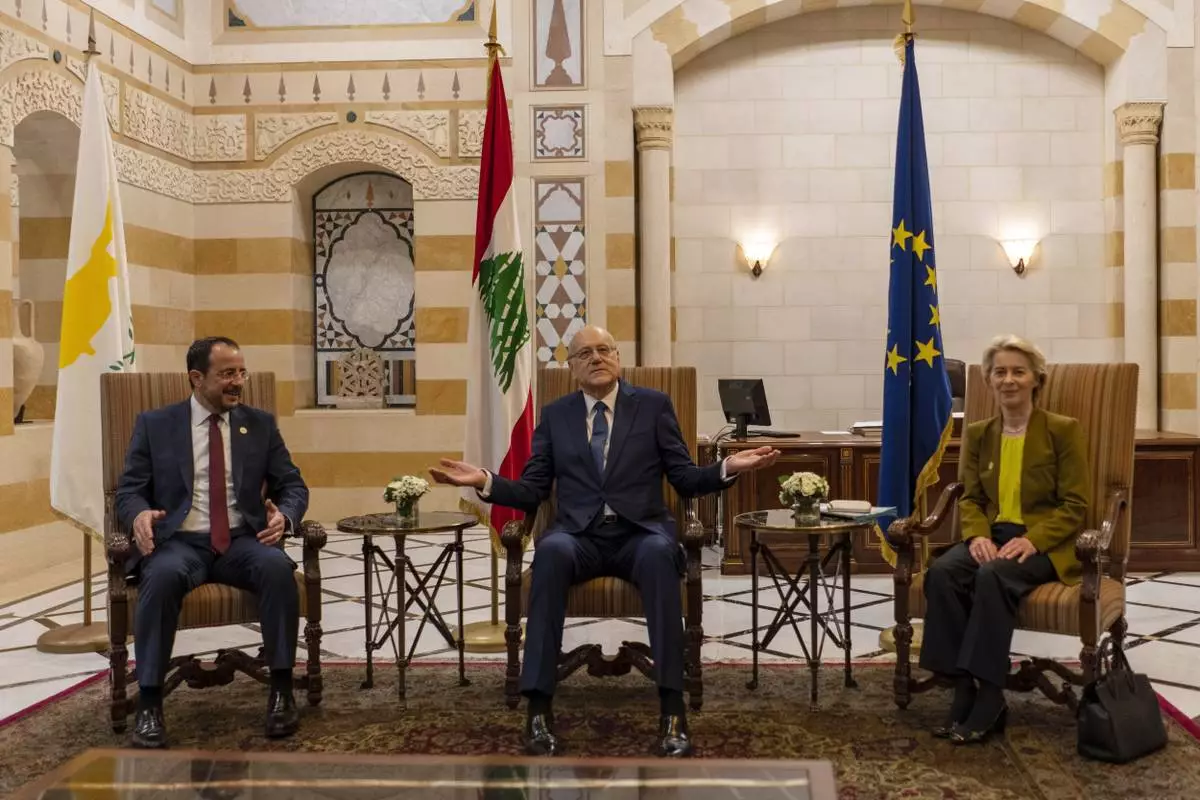
Lebanese caretaker Prime Minister Najib Mikati, center, welcomes Cyprus' president Nikos Christodoulides, left, and President of the European Commission Ursula von der Leyen before their meeting at the government palace in Beirut, Lebanon, Thursday, May 2, 2024. (AP Photo/Hassan Ammar)
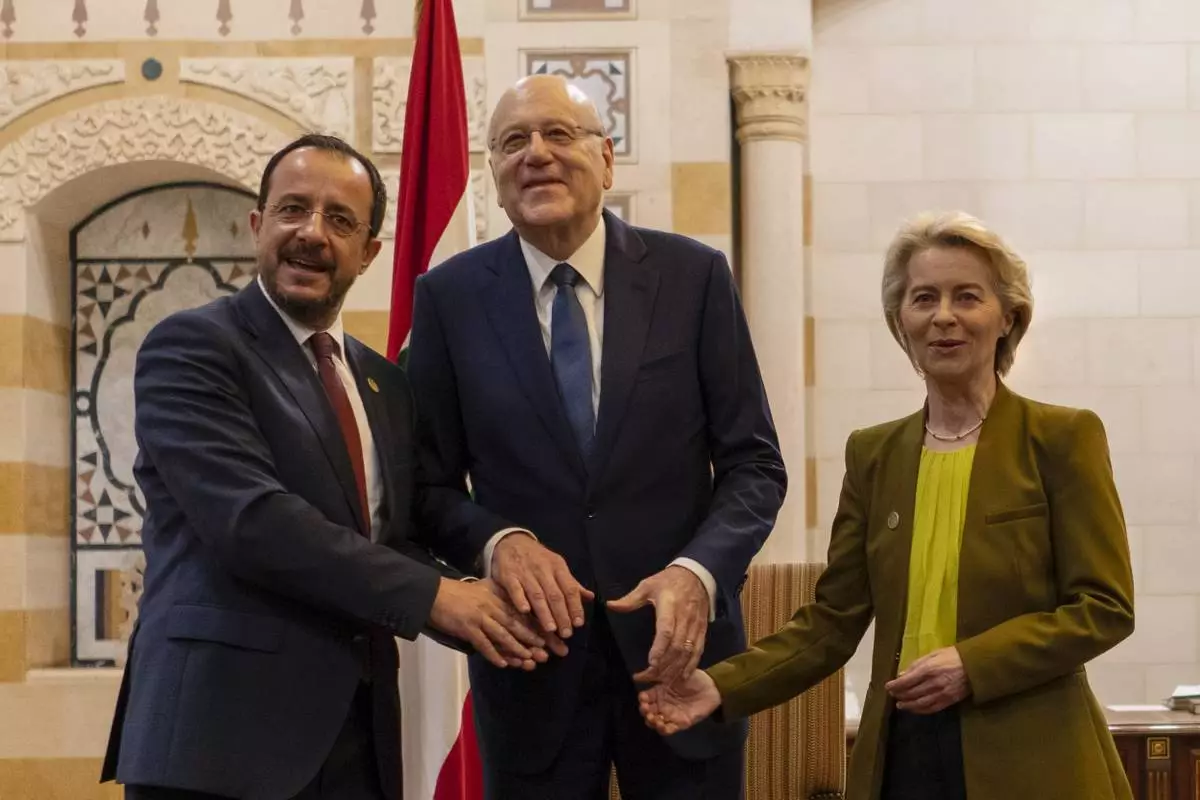
Lebanese caretaker Prime Minister Najib Mikati, center, Cyprus' President Nikos Christodoulides, left, and President of the European Commission Ursula von der Leyen pose for photograph at the government palace in Beirut, Lebanon, Thursday, May 2, 2024. (AP Photo/Hassan Ammar)
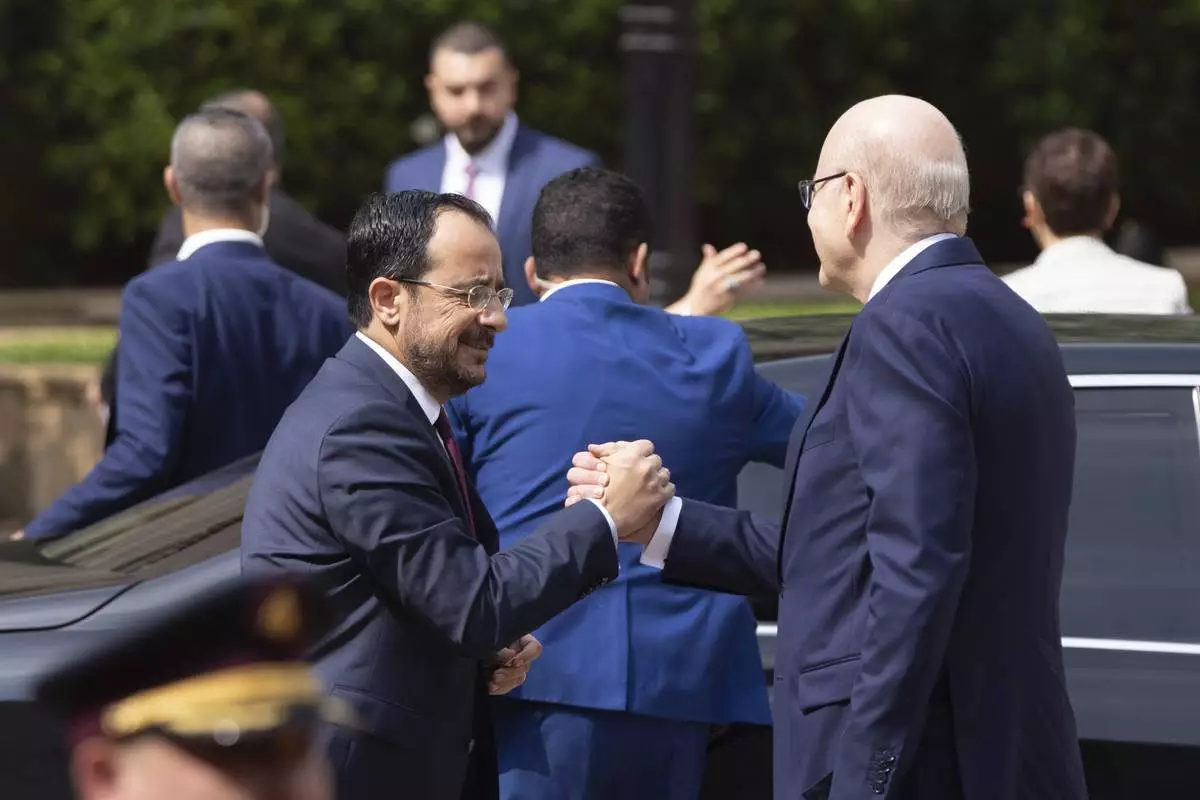
Lebanese caretaker Prime Minister Najib Mikati, right, welcomes Cyprus' president Nikos Christodoulides before their meeting at the government palace in Beirut, Lebanon, Thursday, May 2, 2024. (AP Photo/Hassan Ammar)

Cyprus' President Nikos Christodoulides, left, and President of the European Commission Ursula von der Leyen, center, review an honor guard upon their arrival to meet with the Lebanese Speaker Nabih Berri, in Beirut, Thursday, May 2, 2024. (AP Photo/Hussein Malla)

Lebanese caretaker Prime Minister Najib Mikati, center, speaks during his meeting with Cyprus' President Nikos Christodoulides, left, and President of the European Commission Ursula von der Leyen at the government palace in Beirut, Lebanon, Thursday, May 2, 2024. (AP Photo/Hassan Ammar)
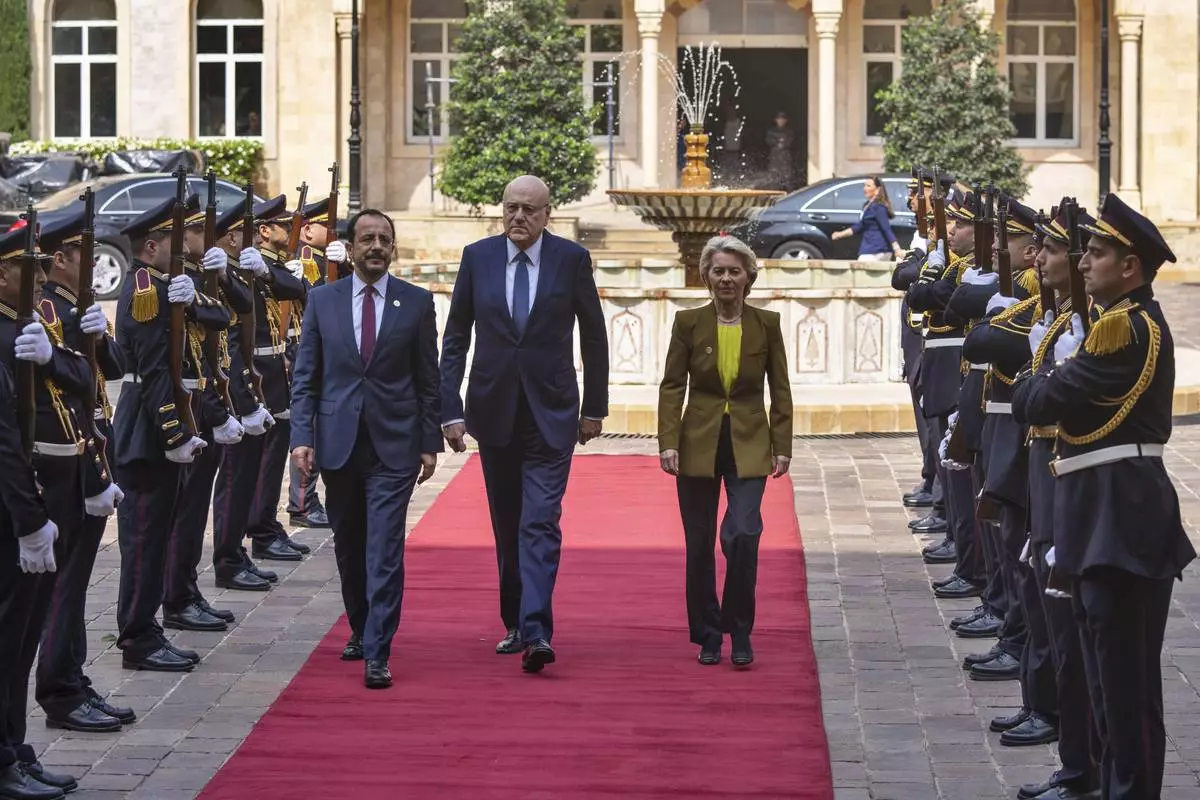
Lebanese caretaker Prime Minister Najib Mikati, center, welcomes Cyprus' President Nikos Christodoulides, left, and President of the European Commission Ursula von der Leyen at the government palace in Beirut, Lebanon, Thursday, May 2, 2024. (AP Photo/Hassan Ammar)
















